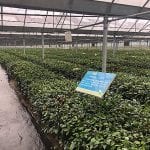Around The Web
COP24: Roundup for Tuesday, Dec. 11
Use of fish discard exemptions by EU trawlers soars before ban
WWF says exemptions undermine landing obligation taking full effect next month
The use of exemptions to EU restrictions on fish discards by EU trawlers has risen by 300% in the last year, according to research released three weeks before a ban is due to take full effect.
The dispensation allowing fishing fleets to discard up to 7% of their catches will continue after January 1 2019, undermining the “landing obligation” on boats to retain and bring to port all seafood catches, according to a report by WWF Europe.
Continue reading...Analyst, Climate Policy or Transportation and Urban Solutions, Pembina Institute – Toronto
“Australia first” rooftop solar trading trial kicks off in WA
 Western Australia energy minister launches world-leading active, billed, peer-to-peer trading trial allowing 40 households to buy and sell rooftop solar, across the grid.
Western Australia energy minister launches world-leading active, billed, peer-to-peer trading trial allowing 40 households to buy and sell rooftop solar, across the grid.
The post “Australia first” rooftop solar trading trial kicks off in WA appeared first on RenewEconomy.
Sydney councils charge up electric vehicle infrastructure
 Three councils in Sydney's eastern suburbs – Waverley, Woollahra and Randwick – join forces to install kerbside EV charging stations.
Three councils in Sydney's eastern suburbs – Waverley, Woollahra and Randwick – join forces to install kerbside EV charging stations.
The post Sydney councils charge up electric vehicle infrastructure appeared first on RenewEconomy.
Musk welcomes General Motors to EV race – but may also buy its factories
 Tesla CEO Elon Musk happy to be outsold by General Motors, but would also consider buying one of its closed auto factories.
Tesla CEO Elon Musk happy to be outsold by General Motors, but would also consider buying one of its closed auto factories.
The post Musk welcomes General Motors to EV race – but may also buy its factories appeared first on RenewEconomy.
Poland hosts UN climate change talks
'We could smell the boat approaching': the grim truth on animal exports
Broken bones and other injuries are common for sheep and cattle held on ships for weeks in cramped pens. Photojournalist Jo-Anne McArthur tracked the 22,000 arrivals on one boat in Israel’s Haifa port
Hundreds of thousands of live animals are transported each year on ships from Australia and Europe to the Middle East. The route from Australia to Israel is particularly long – the journey is three weeks at sea, where cattle and sheep are often kept in cramped pens for the duration.
It’s estimated this year Israel will import 114,040 animals (cattle and sheep) from Australia, and 409,123 sheep and 169,991 cattle from Europe. Though these figures are lower than the previous year, in general live imports have been on the rise. Israel is expected to import 700,000 live animals this year – up from 200,000 in 2012.
Continue reading...Adani met with environment department 40 times in six months
Coalition ‘holding Adani’s hand’ through mine approvals, Greens senator says
The federal environment department had 40 meetings in six months with Adani representatives to discuss the Carmichael coalmine project, according to responses to a Senate estimates committee.
The department met Adani executives in person at the company’s Brisbane offices, as well as conducting teleconferences, on matters including Adani’s groundwater management plans, the mine’s progress and proposals for the management of the threatened black-throated finch.
Continue reading...NZ Market: NZUs jump to record highs ahead of govt ETS announcement
Big on batteries: government finally seizes on lithium-ion potential
Investment minister touts ‘once-in-a-generation opportunity’ but until now government criticised for lack of engagement
The federal government wants to seize a “once-in-a-generation opportunity” to position Australia as a world leader in the rapidly developing lithium-ion battery manufacturing sector.
Releasing a new strategy document from Austrade on Tuesday, the investment minister, Simon Birmingham, said the time was right to capitalise on growing global demand.
Continue reading...East Antarctica's glaciers are stirring
MIT team gains ground on molten silicon energy storage concept
 Massachusetts Institute of Technology team publishes conceptual design for renewable energy storage system using large tanks of white-hot molten silicon that could help "power a small city."
Massachusetts Institute of Technology team publishes conceptual design for renewable energy storage system using large tanks of white-hot molten silicon that could help "power a small city."
The post MIT team gains ground on molten silicon energy storage concept appeared first on RenewEconomy.
Whyalla goes greener with $145m solar greenhouse, as Gupta effect grows
 In a "big reveal" alongside GFG Alliance's Sanjeev Gupta, Whyalla City Council announces China-backed deal to build 70 hectare solar powered intensive horticulture facility.
In a "big reveal" alongside GFG Alliance's Sanjeev Gupta, Whyalla City Council announces China-backed deal to build 70 hectare solar powered intensive horticulture facility.
The post Whyalla goes greener with $145m solar greenhouse, as Gupta effect grows appeared first on RenewEconomy.
Anger, protests as Australia supports US fossil fuels event at UN climate talks
 Australia joins US to promote fossil fuels at UN climate conference - just days after remaining silent as US, Saudi Arabia, Russia, and Kuwait refused to acknowledge a key global climate report.
Australia joins US to promote fossil fuels at UN climate conference - just days after remaining silent as US, Saudi Arabia, Russia, and Kuwait refused to acknowledge a key global climate report.
The post Anger, protests as Australia supports US fossil fuels event at UN climate talks appeared first on RenewEconomy.
Energy Insiders Podcast: Smart Energy and the first year of the Tesla big battery
 An interview with Neoen on the performance of the Tesla big battery at Hornsdale in its first year, and Australia’s $20 billion wind and solar boom.
An interview with Neoen on the performance of the Tesla big battery at Hornsdale in its first year, and Australia’s $20 billion wind and solar boom.
The post Energy Insiders Podcast: Smart Energy and the first year of the Tesla big battery appeared first on RenewEconomy.



